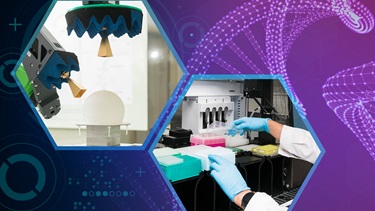Giving back to society with award-winning research projects

Sponsored by

Research projects on antenna technology and atherosclerotic vascular disease (AVD) secured significant grants in the Areas of Excellence Scheme (AoE) and the Theme-based Research Scheme (TRS) funded by the Research Grants Council, Hong Kong.
AoE helps public universities build on existing strengths and develop them into areas of excellence while TRS focuses on supporting the public universities working on themes of strategic importance to the long-term development of Hong Kong.
The successful AoE project, “Advanced Antenna Technology for a Smart World,” is led by Professor Luk Kwai-man, Head and Chair Professor in the Department of Electrical Engineering, and the TRS project is led by Professor Huang Yu, Head, Chair Professor and Jeanie Hu Professor of Biomedical Sciences in the Department of Biomedical Sciences.
The background to the five-year AoE project, which has obtained funding worth HK$69.19 million, is the urgent need to meet global demand for antenna technologies, which are critical to wireless communications, navigation, remote sensing, automotive radars, wireless powering, microwave medical imaging, Internet of Things (IoT), broadband internet, etc.

Professor Luk Kwai-man
The global antenna market is forecast to experience significant growth in the coming decade owing to the demand for faster and more reliable and secure wireless connectivity, and the AoE project will serve as a high-technology hub for advancing innovative antennas and related technologies over a wide spectrum of applications.
“Focusing on new antenna technologies, we will provide a one-stop shop service that covers all aspects, including innovative design, theoretical modelling, prototyping, verification and evaluation of antennas and antenna systems serving these applications and the opportunities for knowledge transfer,” said Professor Luk.
In addition, the Greater Bay Area has a blooming antenna industry for 5G networks and mobile phones, while new roadmaps of digital societies as well as smart cityies of 6G or beyond are being initiated. “It is thus highly desirable to have a global centre of excellence in antennas in Hong Kong for antenna technology innovation, international collaboration on antenna technology and a training centre of bright young antenna professionals,” he added.

Professor Huang Yu
The TRS project, titled “Single-Cell Multi-Omics Study of Atherosclerotic Vascular Disease: Narrowing the Gap Between Bench and Bedside,” has secured HK$55.51 million in funding and will also last five years. It focuses on AVD which leads to 9,700 deaths in Hong Kong and 18 million globally every year.
The primary aim of this TRS research involves exploring comprehensive molecular mechanisms at the heart of the initiation and progression of atherosclerosis and identifying reliable, convenient and economical methods for AVD early detection.
“One of the key challenges in both basic and clinical research is our limited understanding of the pathogenic mechanisms during plaque formation,” explained Professor Huang. “This knowledge gap has hindered the development of early diagnosis and effective therapies.”
Atherosclerosis involves multiple organs and is closely associated with metabolic disorders but traditional research approaches don’t fully explain the complex nature of atherosclerosis, which sparks the urgent need for developing and deploying innovative technologies.
“Our collaborative team will employ cutting-edge single-cell multi-omics technologies to reveal biological information of individual cells in blood vessels and metabolic organs. Such information is vital in uncovering previously unrecognised cell subpopulations, molecular events, and most importantly, cell-cell and organ-organ communications involved during the development of atherosclerosis,” Professor Huang said.
They have recently developed novel methods to trace the origin and destination of circulating proteins and cells, paving the way for developing methods for early diagnosis and precision medicine.
The two projects involve multiple CityU faculty members, as well as local and international collaborators.
https://www.cityu.edu.hk/media/news/2023/07/13/major-rgc-grants-secured-cityu-scientists